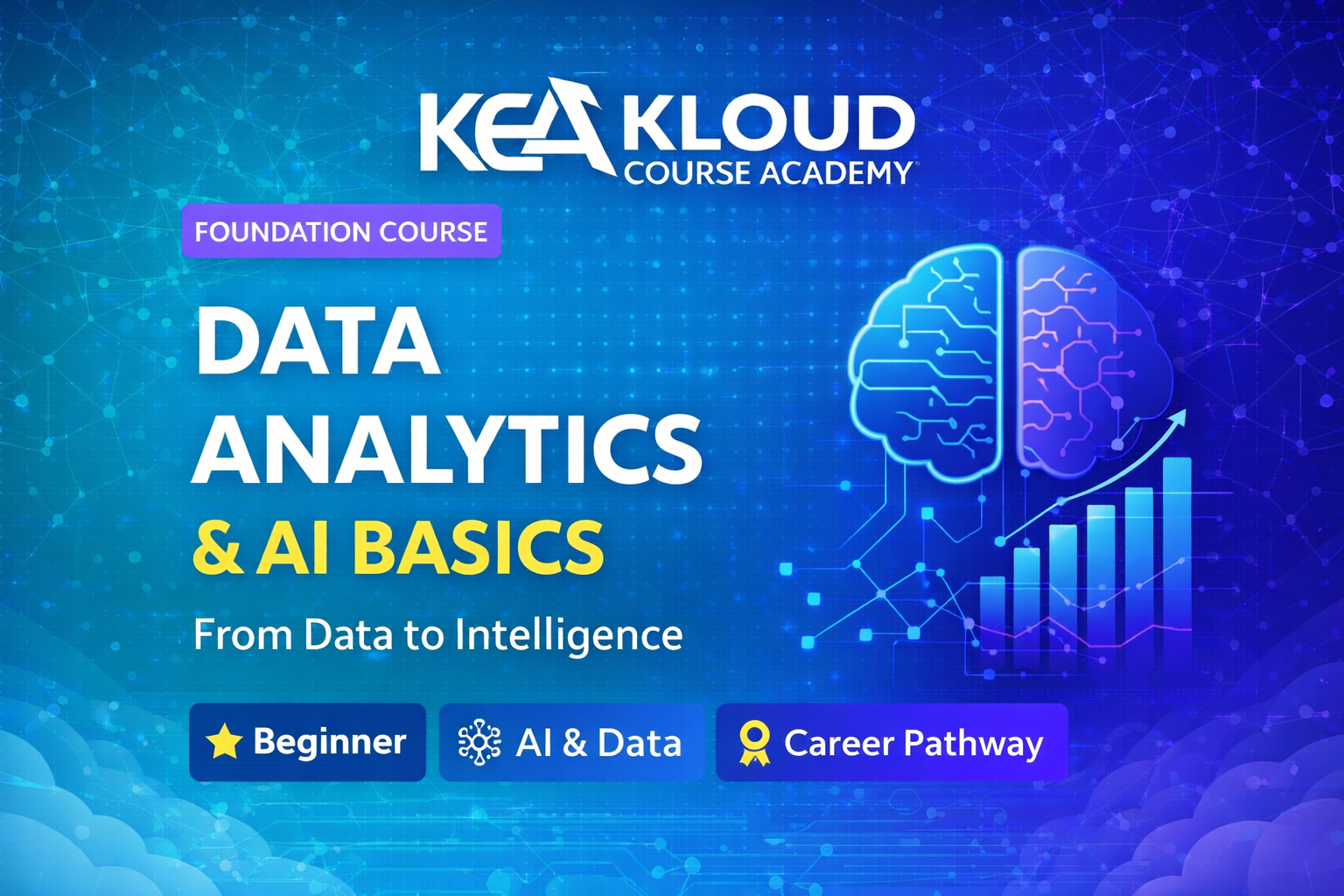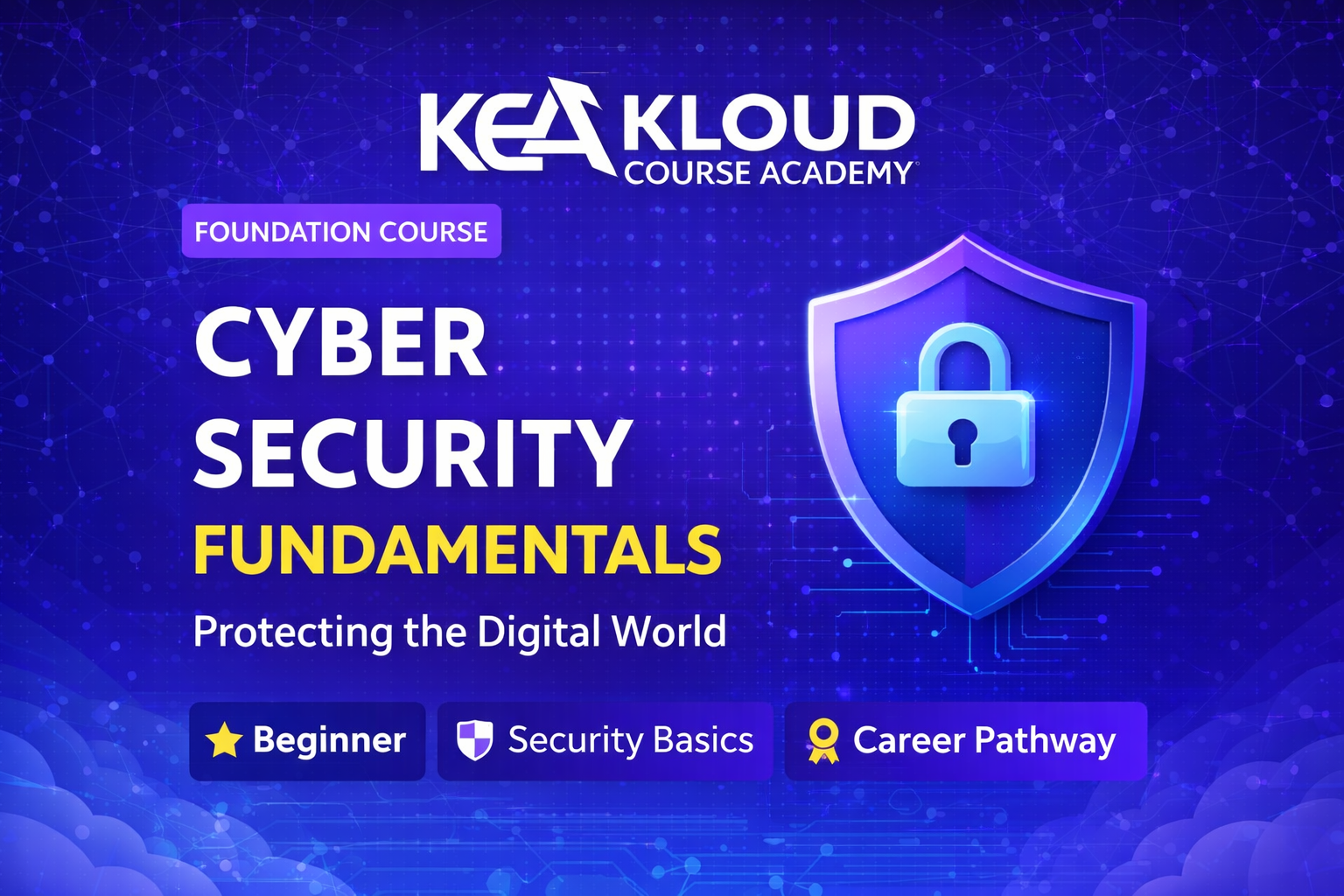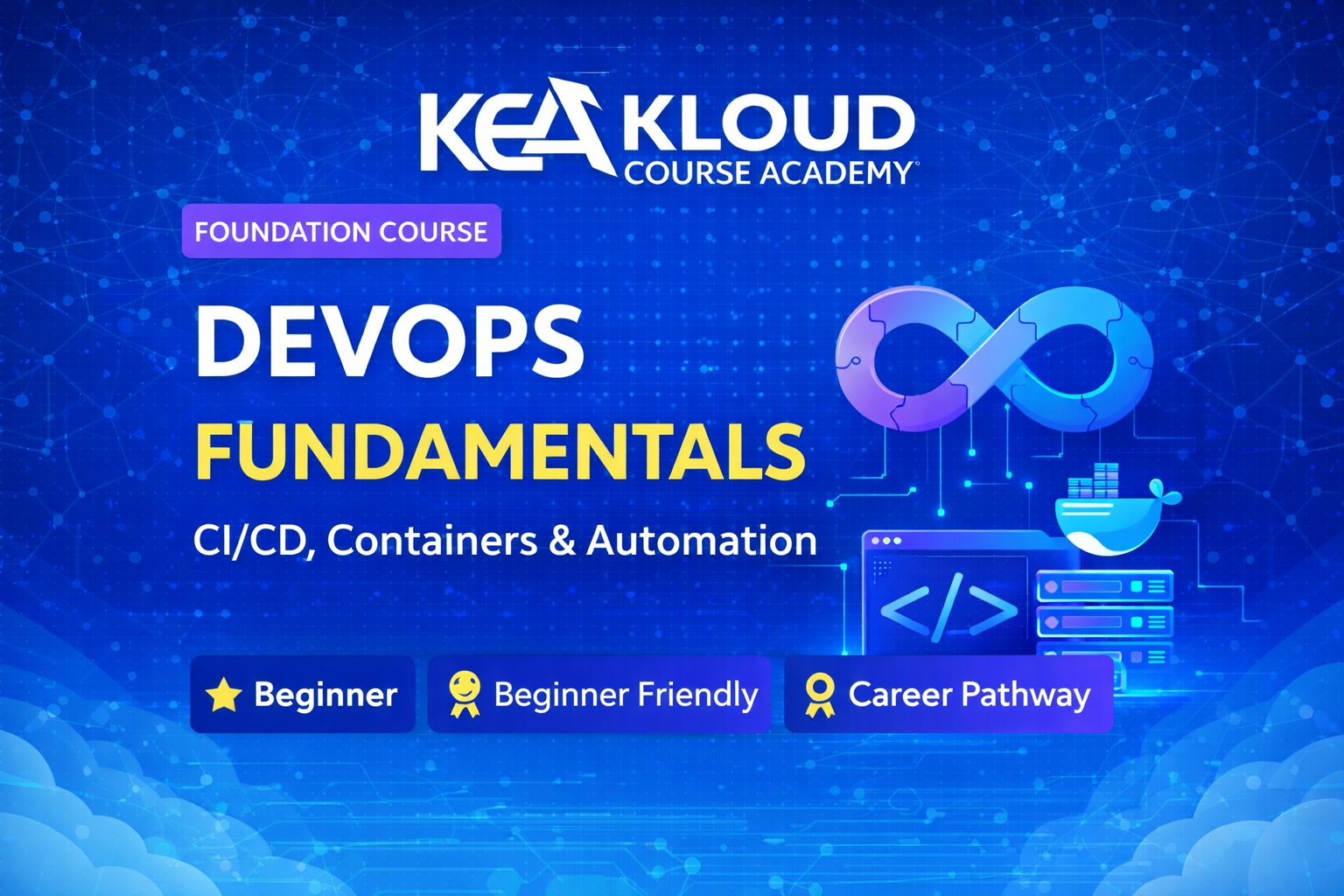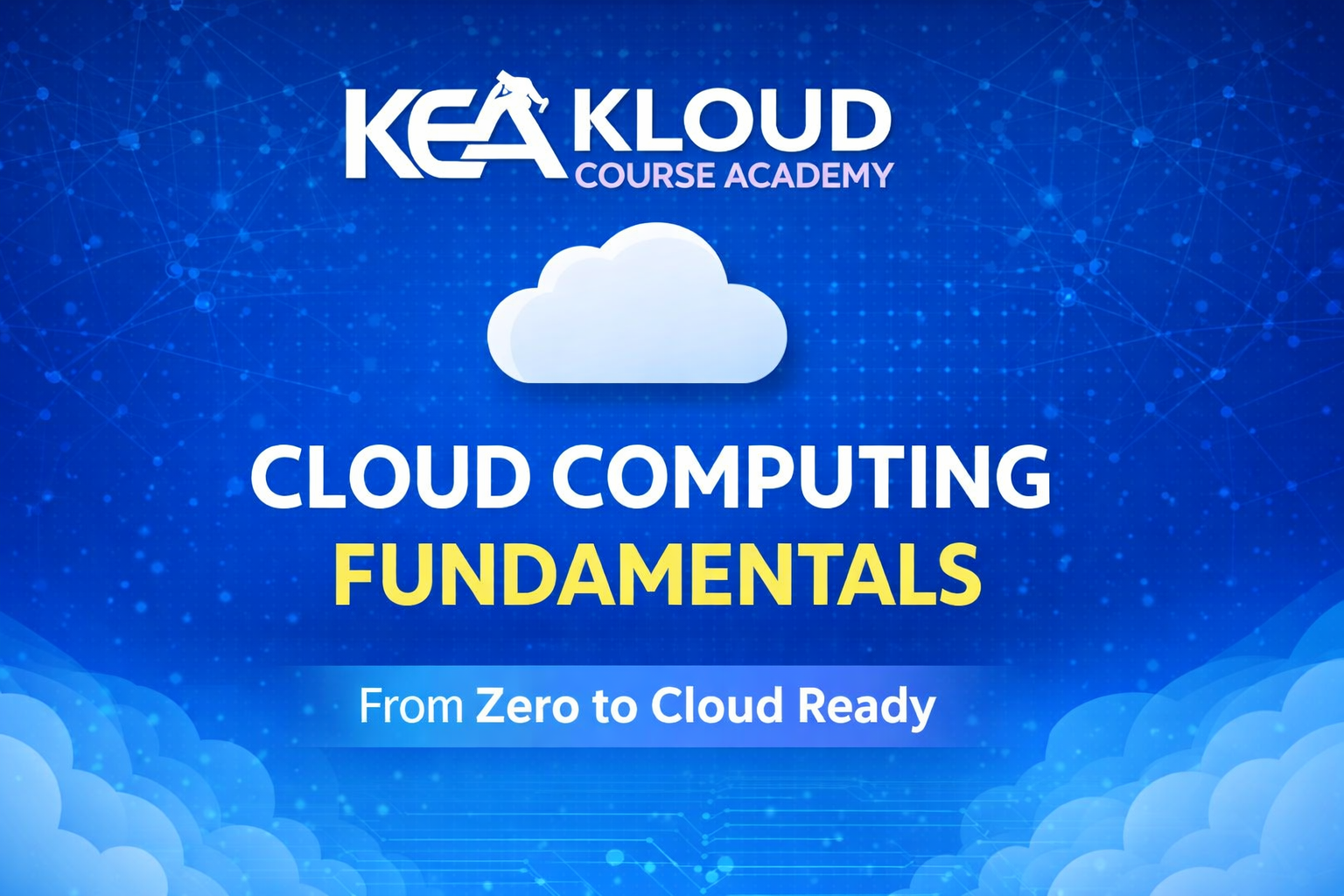Kloud Course Academy’s AWS Training offers, your way to mastering cloud technologies! Our AWS Training and Certification program is designed to equip you with the skills and credentials needed to excel in the rapidly evolving field of cloud computing.
AWS Training and Certification is a leader in cloud services, our training program offers comprehensive coverage of AWS Training and Certification tools, and best practices. Whether you’re a beginner looking to start your career or an experienced professional aiming to deepen your expertise, our courses cater to all skill levels.
AWS training offers hands-on experience and expert guidance to help you master cloud computing with Amazon Web Services. Whether you’re a beginner or seeking advanced skills, our courses cater to all levels of expertise. Gain practical with AWS training knowledge in deploying, managing, and scaling applications on the AWS platform.
- Extensive Program with 2 Modules View all
- 56+ Hours Of Interactive Learning
- 20+ Assignments 4+ Live Projects
- Latest content, as per Microsoft Updates
- Live Online Classes Starting from 10th Aug 2024
Watch Preview Video
- Job Assistance and Support
- Free Add-On Course
- Topics-wise Quizzes
- Hands-on Real-Time Projects
- Lifetime Access to Course videos

4.5
Google Reviews

4.7
Trustpilot Reviews

4.5
G2 Reviews

4.5
Sitejabber Reviews
AWS Training in Hyderabad


Our Masters Program Alumni work for amazing companies
Acquire In-Demand Skills With our AWS Administrator Course
- Designing Identity Solutions
- Monitoring Cloud Solutions
- Cloud Migration & Management
- Infrastructure & Services
- Automation & Scripting
- Cost Optimization
- Cloud Monitoring & Logging
- Communication & Collaboration
- Managing Security
- Designing Resilient AWS Solutions
- Designing Data Storage Solutions
- AWS Cloud Cost Optimization
Tools Covered in AWS Solution Architect Course



























Curriculum Designed by AWS Training in Hyderabad Certified Experts
Topic 1
Week 5-6
Cloud Computing Basics ( Pre – Program )
- Fundamentals of Server Hardware
- Fundamentals of Server OS
- Basics of Networking
- Basics of storage
- Introduction of Virtualization
- Introduction to cloud computing
- Cloud computing fundamentals
Watch Course Recording
Hands-On
- No Hands on Sessions
Skills You Will Learn
- Physical Server Hardware
- Server OS
- Networking
- Storage
- Virtualization
- Cloud Computing
Topic 2
Week 5-6
Design secure access to AWS resources.
Learning objectives
- Applying AWS security best practices to IAM users and root users (for example, multi-factor authentication [MFA])
- Designing a flexible authorization model that includes IAM users, groups, roles, and policies
- Designing role-based access control strategy (for example, AWS Security Token Service [AWS STS], role switching, cross-account access)
- Designing a security strategy for multiple AWS accounts (for example, AWS Control Tower, servicecontrol policies [SCPs]
- Determining the appropriate use of resource policies for AWS service
- Determining when to federate a directory service with IAM roles
Watch Course Recording
Hands-On
- Enabling and configuring multi-factor authentication (MFA)
- Understanding the AWS Security Token Service (STS)
- Implementing service-control policies (SCPs)
- Understanding resource policies
- Configuring S3 bucket policies
- Configuring federation with IAM roles to enable single sign-on (SSO)
Skills You Will Learn
- Applying AWS security best practices to IAM users and root users
- Designing role-based access control strategy
- Designing a security strategy for multiple AWS accounts
- Determining the appropriate use of resource policies for AWS services
- Determining when to federate a directory service with IAM roles
Topic 3
Week 5-6
Design secure workloads and applications.
Learning objectives
- Designing VPC architectures with security components (for example, security groups, route tables, network ACLs, NAT gateways)
- Determining network segmentation strategies (for example, using public subnets and private subnets)
- Integrating AWS services to secure applications (for example, AWS Shield, AWS WAF, AWS SSO, AWS Secrets Manager)
- Securing external network connections to and from the AWS Cloud (for example, VPN, AWS Direct Connect)
Watch Course Recording
Hands-On
- Design secure VPC architectures with security components.
- Determine network segmentation strategies using public and private subnets.
- Integrate AWS services for application security, including AWS Shield, AWS WAF, AWS SSO, and AWS Secrets Manager.
- Secure external network connections to and from the AWS Cloud using VPN and AWS Direct Connect.
Skills You Will Learn
- Designing secure VPC architectures with essential security components.
- Implementing network segmentation strategies for enhanced security.
- Integrating and utilizing AWS services to secure applications effectively
- Securing external network connections to and from the AWS Cloud.
- Gaining expertise in network security best practices and techniques
Topic 4
Week 5-6
Determine appropriate data security controls.
Learning objectives
- Aligning AWS technologies to meet compliance requirements
- Encrypting data at rest (for example, AWS Key Management Service [AWS KMS])
- Encrypting data in transit (for example, AWS Certificate Manager [ACM] using TLS)
- Implementing access policies for encryption keys
- Implementing data backups and replications
- Implementing policies for data access, lifecycle, and protection
- Rotating encryption keys and renewing certificates
Watch Course Recording
Hands-On
- Align AWS technologies for compliance requirements.
- Encrypt data at rest using AWS KMS.
- Encrypt data in transit using ACM with TLS.
- Implement access policies for encryption keys.
- Set up data backups and replications.
- Implement policies for data access, lifecycle, and protection.
- Rotate encryption keys and renew certificates.
Skills You Will Learn
- Aligning AWS technologies to ensure compliance with regulatory requirements.
- Implementing encryption for data at rest using AWS KMS.
- Implementing encryption for data in transit using ACM and TLS.
- Managing access policies for encryption keys.
- Setting up data backups and replication strategies.
- Implementing policies for data access, lifecycle management, and protection.
- Performing key rotation and certificate renewal processes.
Topic 5
Week 5-6
Design scalable and loosely coupled architectures.
Learning objectives
- Designing event-driven, microservice, and/or multi-tier architectures based on requirements
- Determining scaling strategies for components used in an architecture design
- Determining the AWS services required to achieveloose coupling based on requirements
- Determining when to use containers
- Determining when to use serverless technologies and patterns
- Recommending appropriate compute, storage, networking, and database technologies based onrequirements
- Using purpose-built AWS services for workloads
Watch Course Recording
Hands-On
- Design event-driven, microservice, and/or multi-tier architectures.
- Determine scaling strategies for architecture components.
- Identify AWS services for achieving loose coupling.
- Decide when to use containers.
- Decide when to use serverless technologies and patterns.
- Designing VPC architectures with public and private subnets
- Recommend suitable computing, storage, networking, and database technologies.
- Utilize purpose-built AWS services for specific workloads.
Skills You Will Learn
- Designing event-driven, microservice, and multi-tier architectures to meet specific requirements.
- Implementing scaling strategies for components within an architecture.
- Identifying and selecting AWS services to achieve loose coupling in an architecture.
- Understanding when to leverage containers for application deployment.
- Understanding when to utilize serverless technologies and patterns.
- Recommending suitable computing, storage, networking, and database technologies based on requirements.
- Effectively utilizing purpose-built AWS services for specific workloads.
Topic 6
Week 5-6
Design highly available and/or fault-tolerant architectures.
Learning objectives
- Determining automation strategies to ensure infrastructure integrity
- Determining the AWS services required to provide a highly available and/or fault tolerant architecture across AWS Regions or Availability Zones
- Identifying metrics based on business requirements to deliver a highly available solution
- Implementing designs to mitigate single points of failure
- Implementing strategies to ensure the durability and availability of data (for example, backups) Selecting an appropriate DR strategy to meet business requirements
- Using AWS services that improve the reliability of legacy applications and applications not built for the cloud (for example, when application changes are not possible)
- Using purpose-built AWS services for workloads
Watch Course Recording
Hands-on experience:
- Determine automation strategies for infrastructure integrity.
- Identify AWS services for highly available and fault-tolerant architectures.
- Define metrics for delivering a highly available solution.
- Implement designs to mitigate single points of failure.
- Ensure data durability and availability through backup strategies.
- Select an appropriate disaster recovery (DR) strategy.
- Enhance reliability of legacy and non-cloud-native applications using AWS services.
- Utilize purpose-built AWS services for specific workloads.
Skills You Will Learn
- Designing and implementing automation strategies for infrastructure integrity.
- Architecting highly available and fault-tolerant solutions across AWS Regions or Availability Zones.
- Defining metrics to ensure the delivery of highly available solutions.
- Implementing designs to eliminate single points of failure.
- Ensuring data durability and availability through backup strategies.
- Selecting appropriate disaster recovery strategies based on business requirements.
- Enhancing the reliability of legacy and non-cloud-native applications using AWS services.
- Leveraging purpose-built AWS services for optimizing specific workloads.
Topic 7
Week 5-6
Design highly available and/or fault-tolerant architectures.
Learning objectives
- Determining storage services and configurations that meet performance demand
- Determining storage services that can scale to accommodate future needs
Watch Course Recording
Hands-on experience:
- Determine storage services and configurations for meeting performance demands.
- Identify storage services that can scale to accommodate future needs
Skills You Will Learn
- Identify storage services and configurations for specific performance requirements.
- Evaluate storage services for scalability to meet future needs
Topic 8
Week 5-6
Design high-performing and elastic compute solutions.
Learning objectives
- Decoupling workloads so that components can scale independently
- Identifying metrics and conditions to perform scaling actions
- Selecting the appropriate compute options and features (for example, EC2 instance types) to meet business requirements
- Selecting the appropriate resource type and size (for example, the amount of Lambda memory) to meet business requirements
Watch Course Recording
Hands-on experience:
- Decouple workloads for independent scaling of components.
- Identify metrics and conditions for scaling actions.
- Select appropriate compute options (e.g., EC2 instance types) based on business requirements.
- Choose the right resource type and size (e.g., Lambda memory) to meet business needs.
Skills You Will Learn
- Implement workload decoupling for independent scaling.
- Define scaling metrics and conditions.
- Optimize compute options to meet specific business requirements.
- Determine appropriate resource types and sizes for workload optimization.
Topic 9
Week 5-6
Determine high-performing database solutions.
Learning objectives
- Configuring read replicas to meet business requirements
- Designing database architectures
- Determining an appropriate database engine (for example, MySQL compared with PostgreSQL
- Determining an appropriate database type(for example, Amazon Aurora, Amazon DynamoDB
- Integrating caching to meet business requirements
Watch Course Recording
Hands-on experience:
- Configure read replicas to meet business requirements.
- Design database architectures.
- Determine appropriate database engine options (e.g., MySQL, PostgreSQL).
- Determine appropriate database types (e.g., Amazon Aurora, Amazon DynamoDB).
- Integrate caching to meet business requirements.
Skills You Will Learn
- Configuring read replicas for improved database performance.
- Designing effective and scalable database architectures.
- Evaluating and selecting the right database engine for specific use cases.
- Choosing the suitable database type based on requirements.
- Implementing caching strategies for enhanced performance.
Topic 10
Week 5-6
Determine high-performing and/or scalable network architectures.
Learning objectives
- Edge networking services with appropriate use cases (for example, Amazon CloudFront, AWS Global Accelerator)
- How to design network architecture (for example, subnet tiers, routing, IP addressing)
- Load balancing concepts(for example, Application Load Balancer)
- Network connection options (for example, AWS VPN, Direct Connect, AWS PrivateLink) Learning objectives
- Creating a network topology for various architectures (for example, global,hybrid, multi-tier)
- Determining network configurations that can scale to accommodate future needs
- Determining the appropriate placement of resources to meet business requirements
- Selecting the appropriate load balancingstrategy
Watch Course Recording
Hands-on experience:
- Utilize edge networking services (e.g., Amazon CloudFront, AWS Global Accelerator) for specific use cases.
- Design network architecture, including subnet tiers, routing, and IP addressing.
- Understand load balancing concepts, particularly Application Load Balancer.
- Explore network connection options (e.g., AWS VPN, Direct Connect, AWS PrivateLink).
Skills You Will Learn
- Create network topologies for various architectures (e.g., global, hybrid, multi-tier).
- Determine scalable network configurations for future needs.
- Strategically place resources to meet business requirements.
- Select appropriate load balancing strategies based on use cases.
Topic 11
Week 5-6
Determine high-performing data ingestion and transformation solutions.
Learning objectives
- Building and securing data lakes
- Designing data streaming architectures
- Designing data transfer solutions
- Implementing visualization strategies
- Selecting appropriate compute options for data processing (for example,Amazon EMR)
- Selecting appropriate configurations for ingestion
- Transforming data between formats (for example, .csv to .parquet)
Watch Course Recording
Hands-on experience:
- Build and secure data lakes.
- Design data streaming architectures.
- Create data transfer solutions.
- Implement visualization strategies.
- Utilize appropriate compute options, like Amazon EMR, for data processing.
- Configure optimal data ingestion setups.
- Transform data between different formats, such as .csv to .parquet.
Skills You Will Learn
- Building and securing data lakes.
- Designing effective data streaming architectures.
- Implementing efficient data transfer solutions.
- Utilizing visualization strategies for data analysis.
- Selecting the right compute options for data processing.
- Configuring optimal data ingestion setups.
- Transforming data between different formats.
Topic 12
Week 5-6
Design cost-optimized storage solutions.
Learning objectives
- Designing appropriate storage strategies (for example, batch uploads to Amazon S3 compared with individual uploads)
- Determining the corre1ct storage size for a workload
- Determining the lowest cost method of transferring data for a workload to AWS storage
- Determining when storage auto scaling is required
- Managing S3 object lifecycles
- Selecting the appropriate backup and/or archival solution
- Selecting the appropriate service for datamigration to storage services
- Selecting the appropriate storage tier
- Selecting the correct data lifecycle for storage
- Selecting the most cost-effective storage service for a workload
Watch Course Recording
Hands-on experience:
- Design storage strategies considering batch and individual uploads to Amazon S3.
- Determine workload-specific storage size requirements
- Identify cost-effective data transfer methods to AWS storage.
- Implement storage auto scaling when necessary.
- Manage S3 object lifecycles effectively.
- Select appropriate backup and archival solutions.
- Migrate data to storage services using the right tools.
- Choose the suitable storage tier for workloads.
- Define optimal data lifecycle strategies for storage.
- Select cost-effective storage services for specific workloads.
Skills You Will Learn
- Designing effective storage strategies for various scenarios.
- Calculating storage size based on workload demands.
- Optimizing data transfer methods to AWS storage.
- Implementing storage auto scaling as per requirements.
- Efficiently managing S3 object lifecycles.
- Selecting appropriate backup and archival solutions.
- Conducting data migration to storage services.
- Choosing the right storage tier for workloads.
- Defining data lifecycle strategies for storag
- Evaluating cost-effective storage solutions for specific workloads.
Topic 13
Week 5-6
Design cost-optimized compute solutions.
Learning objectives
- Determining an appropriate load balancing strategy (for example, Application Load Balancer [Layer 7] compared with Network Load Balancer [Layer 4] compared with Gateway Load Balancer)
- Determining appropriate scaling methods and strategies for elastic workloads (for example,horizontal compared with vertical, EC2 hibernation)
- Determining cost-effective AWS compute services with appropriate use cases (for example, Lambda, Amazon EC2, Fargate)
- Determining the required availability for different classes of workloads (for example, production workloads, non-production workloads)
- Selecting the appropriate instance family for a workload
- Selecting the appropriate instance size for a workload
Watch Course Recording
Hands-on experience:
- Determine load balancing strategies (e.g., Application Load Balancer, Network Load Balancer, Gateway Load Balancer).
- Identify scaling methods for elastic workloads (e.g., horizontal, vertical, EC2 hibernation).
- Select cost-effective compute services for specific use cases (e.g., Lambda, Amazon EC2, Fargate).
- Determine availability requirements for different workload types (e.g., production, non-production).
- Select the appropriate instance family and size for workloads.
Skills You Will Learn
- Evaluate and select load balancing strategies based on requirements.
- Implement effective scaling methods for elastic workloads.
- Choose cost-effective compute services for various use cases.
- Determine availability levels for different workload types.
- Select optimal instance families for specific workloads.
- Choose suitable instance sizes to meet workload demands.
Topic 14
Week 5-6
Design cost-optimized database solutions.
Learning objectives
- Designing appropriate backup and retention policies (for example, snapshot frequency)
- Determining an appropriate database engine (for example, MySQL compared with PostgreSQL)
- Determining cost-effective AWS database services with appropriate use cases (for example,DynamoDB compared with Amazon RDS, serverless)
- Determining the required availability for different classes of workloads (for example, production workloads, non-production workloads)
- Determining cost-effective AWS database types (for example, time series format, columnar format)
- Migrating database schemas and data to different locations and/or different database engines
Watch Course Recording
Hands-on experience:
- Design backup and retention policies, including snapshot frequency.
- Select the appropriate database engine (e.g., MySQL, PostgreSQL).
- Choose cost-effective AWS database services for specific use cases (e.g., DynamoDB, Amazon RDS, serverless).
- Determine cost-effective database types (e.g., time series, columnar).
- Perform database schema and data migration across locations or engines.
Skills You Will Learn
- Designing effective backup and retention policies for databases.
- Selecting the suitable database engine based on requirements.
- Evaluating and selecting cost-effective AWS database services for various use cases.
- Determining optimal database types for specific needs.
- Conducting database migration across different locations and engines.
Tpoic 15
Week 5-6
Design cost-optimized network architectures.
Learning objectives
- Configuring appropriate NAT gateway types for a network (for example, a single shared NAT gateway compared with NAT gateways for each Availability Zone)
- Configuring appropriate network connections (for example, Direct Connect compared with VPN compared with internet)
- Configuring appropriate network routes to minimize network transfer costs (for example, Region to Region, Availability Zone to Availability Zone, private to public, Global Accelerator, VPC endpoints)
- Determining strategic needs for content delivery networks (CDNs) and edge caching
- Reviewing existing workloads for network optimizations
- Selecting an appropriate throttling strategy
- Selecting the appropriate bandwidth allocation for a network device (for example, a single VPN compared with multiple VPNs, Direct Connect speed
Watch Course Recording
Hands-on experience:
- Configure NAT gateways for network connectivity: single shared NAT gateway or NAT gateways for each Availability Zone.
- Configure network connections: Direct Connect, VPN, and internet.
- Configure network routes to minimize transfer costs: Region to Region, Availability Zone to Availability Zone, private to public, Global Accelerator, and VPC endpoints
- Determine needs for content delivery networks (CDNs) and edge caching.
- Review workloads for network optimizations.
- Select throttling strategies.
- Allocate appropriate bandwidth for network devices.
Skills You Will Learn
- Configuring NAT gateways for network connectivity.
- Setting up network connections: Direct Connect, VPN, and internet.
- Optimizing network routes to reduce transfer costs.
- Implementing CDNs and edge caching for efficient content delivery.
- Analyzing and optimizing network configurations.
- Applying throttling strategies for network traffic management.
- Allocating bandwidth effectively for network devices.
Key Highlights of the Program
- Direct Access to Trainer
- Live – Instructure Led
- LMS
- Screen share from working professionals
- Certification Exams
- Mock Interviews
- Interview support
- Job support
- Communication & Collaboration
- Certification Exams
- Mock Interviews
- Screen share from working professionals
- Interview support
- Job support
- Communication & Collaboration
Why Choose Kloud Course Academy for AWS training and certificate
Live Interactive Learning
- World-Class Certified Instructors
- Expert-Led Mentoring Sessions
- Instant doubt clearing
Access to resources
- Video Tutorials
- Practice Quizzes
- Step-by-Step Lab Guides
Post Course Support
- Learning Assistance
- Job Guidence
- Resume Building
Hands-On Projects
- Industry-Relevant Projects
- Cloud Migration Included
- Quizzes & Assignments
AWS Training and Certification
- KloudCourse Training Certificate
- Graded Performance Certificate
- Certificate of Completion
Instructor-led AWS Training and Certification live online Course Training Schedule
[book_batchall catid=”21″]
Not sure? Talk to our advisors
OR
Take pride in your accomplishments with our AWS Training and Certification
- AWS Certified Cloud Practitioner
- AWS Certified Developer – Associate
- AWS Certified SysOps Administrator – Associate
- AWS Certified Solutions Architect – Associate
- AWS Certified DevOps Engineer – Professional
- AWS Certified Solutions Architect – Professional
- AWS Certified Advanced Networking – Specialty
- AWS Certified Security – Specialty
- AWS Certified Machine Learning – Specialty
- AWS Certified Database – Specialty
If you are considering AWS training and certification, Kloud Course Academy is the ideal choice. Our AWS Certification Training provides expert instruction from AWS-certified professionals, ensuring you receive the best guidance to excel in the cloud computing domain. With a comprehensive curriculum and hands-on training, you’ll gain practical experience in using various AWS services and solutions. The training is designed to prepare you for AWS certification exams, giving you a competitive edge in the job market. Choose Kloud Course Academy for top-notch AWS Certification Training and embark on a successful career journey in cloud computing.
AWS Certification holds significant value in the IT industry for several reasons:
- Industry Recognition
- Skill Validation
- Career Advancement
- Credibility
- Competitive Advantage
- Customer Trust
- Access to AWS Resources
Kloudcourse Academy offers various AWS certification paths to help learners become proficient in using Amazon Web Services. Here’s a list of the AWS certification paths offered by Kloudcourse Academy:
AWS Certified Cloud Practitioner (Foundational):
This certification is suitable for individuals who are new to AWS and want to understand the basics of AWS Cloud services and their use cases.
AWS Certified Solutions Architect – Associate:
This certification is designed for individuals with some knowledge of AWS services and experience in designing distributed applications. They will learn how to create well-architected solutions using AWS best practices.
AWS Certified Developer – Associate:
This certification is for developers who have experience with AWS services and want to learn how to develop, deploy, and debug cloud-based applications using AWS.
AWS Certified SysOps Administrator – Associate:
This certification is intended for systems administrators who have experience managing and operating AWS infrastructure. They will learn how to maintain, scale, and monitor AWS systems.
AWS Certified Solutions Architect – Professional:
This advanced certification is for experienced solutions architects who have already achieved the associate level certification. They will learn how to design and deploy scalable, secure, and reliable applications on AWS.
AWS Certified DevOps Engineer – Professional:
This certification is for individuals with experience in both development and operations. They will learn how to implement and manage continuous delivery systems and methodologies on AWS, as well as automate security controls, governance processes, and compliance validation.
AWS Certified Security – Specialty:
This specialty certification is for individuals who have a deep understanding of AWS security services and want to learn best practices for securing the AWS platform.
AWS Certified Big Data – Specialty:
This specialty certification is for individuals who have experience in data analytics and want to learn how to design, build, secure, and maintain analytics solutions using AWS services.
AWS Certified Advanced Networking – Specialty:
This specialty certification is for individuals who have a strong background in networking and want to learn how to design, develop, and deploy AWS services to support complex network architectures.
AWS Certified Machine Learning – Specialty:
This specialty certification is for individuals who have experience in machine learning and want to learn how to design, implement, and maintain machine learning solutions on the AWS platform.
- AWS Certified Cloud Practitioner: Around $100 USD
- AWS Certified Solutions Architect – Associate: Around $150 USD
- AWS Certified Developer – Associate: Around $150 USD
- AWS Certified SysOps Administrator – Associate: Around $150 USD
- AWS Certified Solutions Architect – Professional: Around $300 USD
- AWS Certified DevOps Engineer – Professional: Around $300 USD
Timeframe. Three years are allowed to pass from the date of certification obtained through AWS. To keep your certification current and active, you must recertify before the three-year window closes.
To pass your AWS Solutions Architect certification exam, follow these steps:
- Understand Exam Blueprint
- Study AWS Whitepapers and Documentation
- Enroll in AWS Training
- Practice with AWS Free Tier
- Take Practice Exams
- Focus on Security and Cost Optimization
- Review Sample Questions
- Manage Your Time
- Stay Confident and Relaxed
If, by chance, you fail the AWS certification exam on your first try, you have 14 days to request a retest.
The AWS Certified Solutions Architect exam is designed for individuals who want to demonstrate their expertise in designing and deploying scalable, secure, and cost-effective AWS-based solutions.
To obtain AWS training and certification, follow these steps:
- Choose Your Certification Path
- Study and Prepare
- Hands-on Practice
- Schedule the Exam
- Take the Exam
- Pass the Exam
- Maintain and Renew
To find all AWS Certified Solutions Architect exam details, visit the official AWS Certification website at https://aws.amazon.com/certification/
To become an AWS Solutions Architect, follow these simple steps:
- Learn Cloud Basics: Understand what cloud computing is and how it works.
- Explore AWS Services: Study different AWS services and their uses on the AWS website.
- Take AWS Training: Enroll in AWS Solutions Architect training to gain in-depth knowledge.
- Practice with AWS: Use AWS Free Tier to experiment with building solutions on AWS.
- Prepare for the Exam: Review exam guides and take practice tests to get ready.
- Pass the Certification: Take the AWS Solutions Architect certification exam and pass it.
- Gain Experience: Work on real projects to apply your AWS skills practically.
By completing these steps, you can become an AWS Solutions Architect and design effective solutions using AWS services.
Learning Path
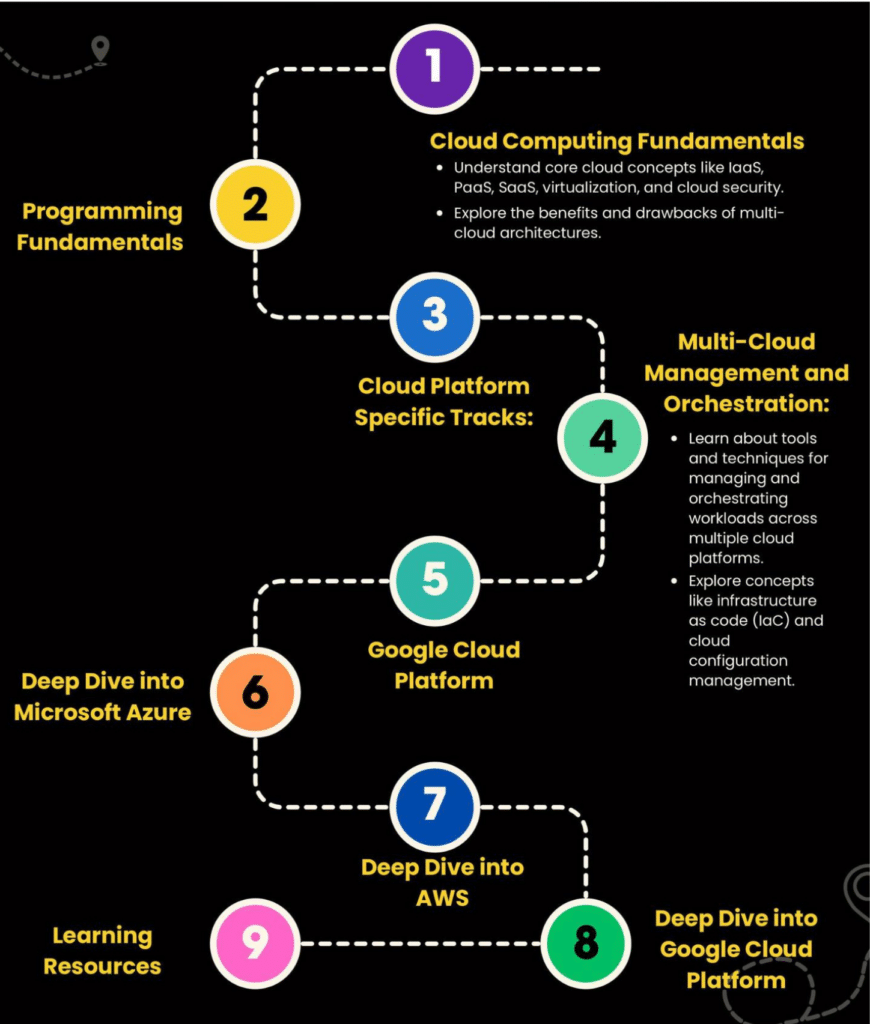
Cloud Masters Job Outlook
Industry Growth

14 Million Career Opportunities
Nasscom estimates that large-scale adoption of Cloud has the potential

21.4 % Annual Growth
Market Research Future predicts the worldwide public cloud
Cloud Architect Average Annual Salary
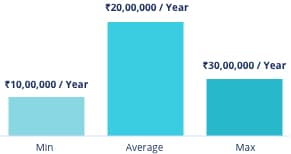
Top Industries
Target Roles
- Cloud Architect
- AWS Solutions Architect
- DevOps Lead
- Cloud Engineer
- Cloud Developer
-
Devops Engineer
- AWS DevOps Engineer
Know about your future prospect?
Learn More About Our Expertly Designed
AWS Training and Certification Course Description
Look no further for AWS classroom training! Kloud Course Academy offers AWS Training in Hyderbad with expert instructors and hands-on learning experience. Our classroom training allows you to interact with instructors and peers, providing a personalized and engaging learning environment. With a comprehensive curriculum and exam preparation, you’ll be fully equipped to succeed in AWS certification exams and advance your career in cloud computing. Choose Kloud Course Academy for AWS classroom training and take the next step towards becoming an AWS-certified professional.
Please get in touch with us for aws classroom sessions.
In Kloud Course Academy’s Online AWS Training and Certification Course, participants will learn a comprehensive range of topics related to Amazon Web Services. The course covers:
Introduction to AWS: Participants will gain a fundamental understanding of AWS, its global infrastructure, and the key services it offers.
AWS Core Services: Learners will explore core AWS services like Amazon EC2, Amazon S3, Amazon RDS, AWS Lambda, and more, understanding their functionalities and use cases.
Security in AWS: Participants will learn about AWS Identity and Access Management (IAM), security best practices, and how to secure AWS resources.
Networking in AWS: The course covers Virtual Private Cloud (VPC), subnets, security groups, and network access control to build secure and isolated environments.
AWS Management Tools: Learners will be introduced to AWS Management Console, AWS CLI, and other management tools for efficient cloud administration.
Architecting in AWS: Participants will understand how to design resilient and scalable architectures for applications using various AWS services.
Cost Optimization: The training covers cost management strategies, billing, and how to optimize AWS Training and Certification resource usage to control expenses. AWS Well-Architected Framework: Participants will learn about the AWS Well-Architected Framework and how to apply its principles in designing cloud solutions.
AWS Training is suitable for anyone interested in cloud computing, including:
- IT Professionals
- Developers
- System Administrators
- Solution Architects
- Cloud Enthusiasts
- Project Managers
- Professionals Seeking Career Growth
Hyderabad is emerging as a hub for technology and IT industries, with a growing demand for skilled professionals in cloud computing, particularly AWS. AWS Training offers you the opportunity to learn from industry experts, gain hands-on experience, and enhance your career prospects in one of the fastest-growing technology domains.
You can enroll in AWS Training in Hyderabad through various training providers, both online and offline. Search for reputable training institutes or visit the official AWS Training and Certification website for authorized training partners and schedules.
There are no mandatory prerequisites for the Kloud Course Academy AWS Solution Architect Training; having prior knowledge and experience in IT Infrastructure and Basic programming skills can help students better understand the AWS Solution Architect course content and improve their learning experience.
1. Introduction to Cloud Computing and AWS
- Cloud computing concepts
- AWS overview and history
- AWS global infrastructure
- AWS service offerings
2. AWS Management Console and CLI
- AWS Management Console
- AWS Command Line Interface (CLI)
- AWS SDKs and APIs
3. AWS Identity and Access Management (IAM)
- Users, groups, and roles
- IAM best practices
4.Amazon EC2 (Elastic Compute Cloud)
- Instances and instance types
- Elastic Block Store (EBS)
- Security groups and key pairs
- Elastic IPs and Elastic Network Interfaces (ENIs)
- EC2 pricing and cost optimization
5.Amazon S3 (Simple Storage Service)
- Buckets and objects
- S3 storage classes
- S3 versioning, lifecycle policies, and cross-region replication
- S3 transfer acceleration and data transfer options
6. AWS Networking and VPC (Virtual Private Cloud)
- VPC basics
- Subnets, route tables, and internet gateways
- Network ACLs and security groups
- NAT gateways, VPC peering, and VPC endpoints
- Elastic Load Balancing (ELB) and Auto Scaling
7. Amazon RDS (Relational Database Service)
- RDS overview and supported database engines
- RDS instances and storage options
- RDS backups, snapshots, and replication
- RDS performance tuning and monitoring
8. AWS Serverless Computing
- AWS Lambda
- Amazon API Gateway
- AWS Step Functions
- Amazon EventBridge
9. AWS Developer Tools
- AWS CodeCommit
- AWS CodeBuild
- AWS CodeDeploy
- AWS CodePipeline
10. AWS Monitoring and Logging
- Amazon CloudWatch
- AWS CloudTrail
- AWS Config
- Amazon GuardDuty
11. Other AWS Services
- Amazon SNS (Simple Notification Service)
- Amazon SQS (Simple Queue Service)
- Amazon DynamoDB
- Amazon Elasticsearch
- AWS Backup and AWS Storage Gateway
- AWS migration and transfer services
12. AWS Security, Compliance, and Best Practices
- Shared responsibility model
- AWS security features
- Compliance and certifications
- AWS Well-Architected Framework
13. AWS Architecting and Solutions
- Design principles
- Architecting for fault tolerance, scalability, and cost optimization
- AWS reference architectures and use cases
14. AWS Certification and Exam Preparation
- AWS certification tracks
- Exam objectives and study resources
Tips and strategies for exam preparation
No, coding skills are not necessary for you to take this AWS Professional Certification course.
This AWS course lasts 54 hours (about 2 and a half days) of live instructor-led online and classroom sessions.
An exemplary configuration computer ( Intel i5 or above with 8 GB RAM ) with the latest operating system has a good internet connection.
An exemplary configuration computer ( Intel i5 or above with 8 GB RAM ) with the latest operating system has a good internet connection.

